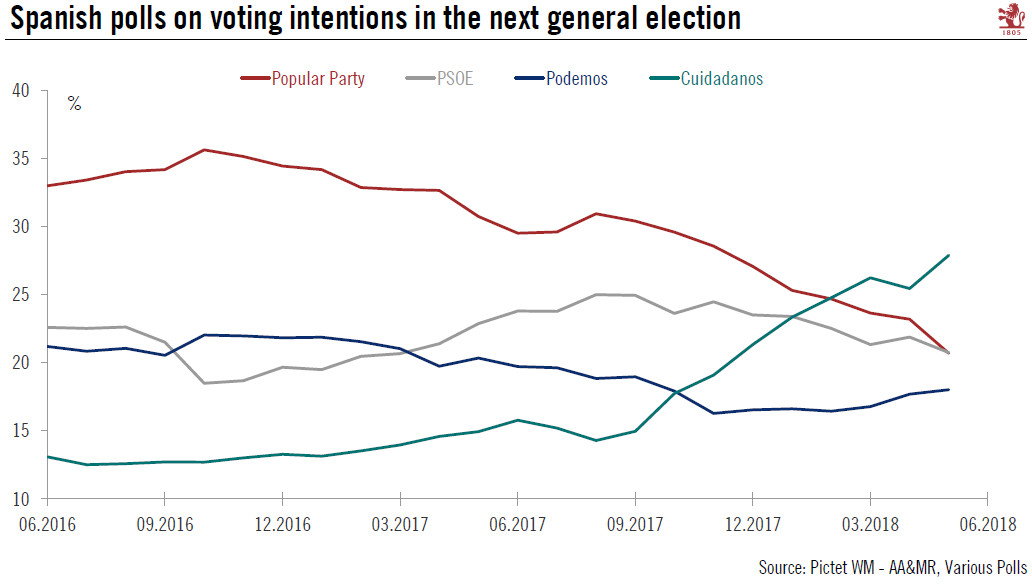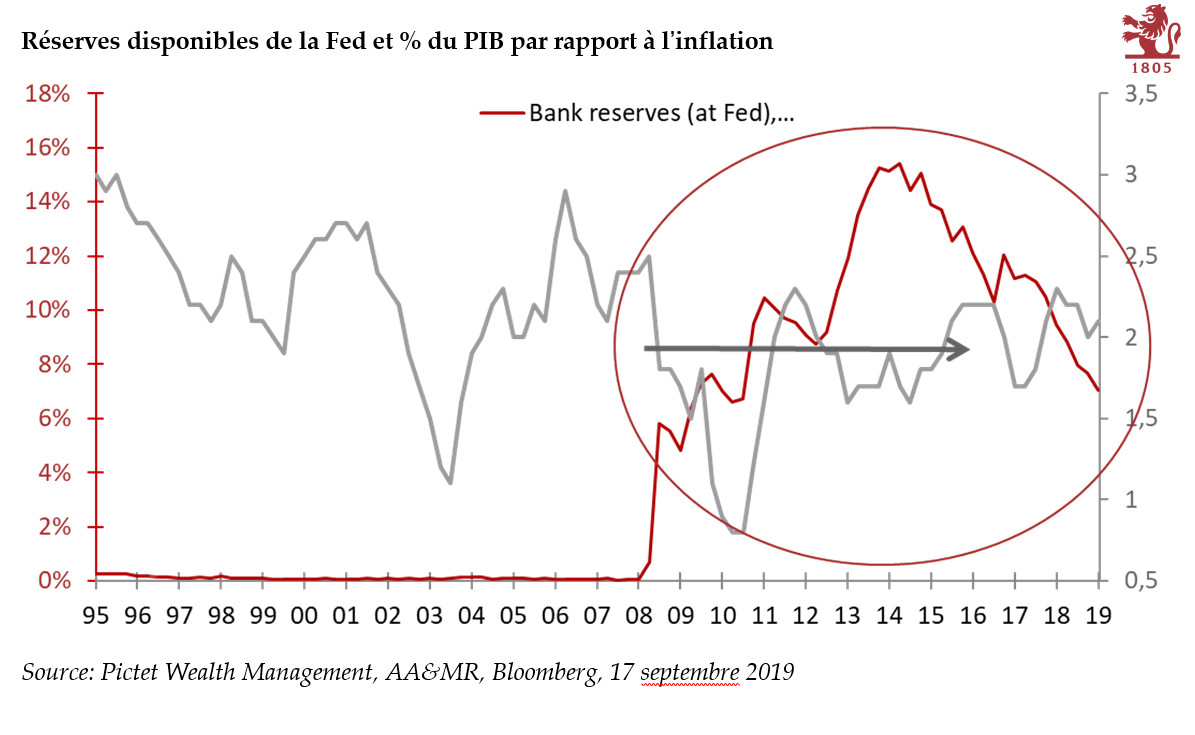Political instability in Spain has added to turmoil in other peripheral countries. The situation is not comparable with the one that Italy is experiencing at the moment, but since it comes at the same time it is increasing market volatility.
Last Friday, Spain’s main oppositionparty, the Socialist party (PSOE) filed a no confidence vote against Prime Minister Mariano Rajoy. The debate will start on May 31 with a vote probably on June 1.
All major opposition parties are calling for Rajoy to step down. Rajoy survived a no-confidence vote in June 2017 called by Podemos, but this time is different. The motion comes just after a high court found Rajoy’s Popular Party (PP) guilty of involvement in a bribes-for-contracts network and the credibility of Mariano Rajoy’s testimony was called into question.
It is still unclear how Socialist leader Pedro Sánchez will secure enough support (176 or more votes) to see Mariano Rajoy voted out. Sanchez will have no trouble securing votes from Podemos (67 seats) but he still need more support. Cuidadanos, the fourth-largest presence in the Spanish parliament (32 seats) wants to unseat Rajoy but does not back the Socialist’s no-confidence motion. The party’s leader Albert Rivera has, however, given Rajoy an ultimatum:“Call a snap election or we’ll work to force you out”. If Rajoy agrees to a ballot in the autumn, Rivera said his party would ensure an orderly end to the government and help the final passage of the budget. The party runs high in polls and would be the main beneficiary of snap elections.
If the Socialist motion is carried, Pedro Sanchez will become the next prime minister. The latter has said that if that happens, he will call fresh elections, although he has not said when. Even if Rajoy survives the no-confidence, he will not be able to pass any legislation as Cuidadanos will no longer be willing to back his government, plunging the country into political deadlock. All major opposition parties agree on the need to vote out Mariano Rajoy and to call snap elections. The disagreement is on how to do it.
Thus, there are increasing chances both Italy and Spain will hold snap elections. But while in Italy the concern is that fresh elections could deliver an even stronger mandate for Italy’s anti-establishment, eurosceptic politicians, in Spain snap elections are likely to produce a hung parliament with a pro-European tilt.
What does the no-confidence motion mean?
The filing of the motion by the Socialist Party comes after a high court found Rajoy’s Popular Party (PP) guilty of involvement in a bribes-for-contracts network in the case known as Gürtel. How the no-confidence motion works is dictated by article 113 and 114 of the Spanish constitution, which states “if Congress passes a motion of censure, the Government shall submit its resignation to the King, while the candidate proposed in the motion of censure shall be considered to have the confidence of the House.” The Socialist initiative is seeking to remove PP leader Mariano Rajoy from office and replace him with PSOE’s leader Pedro Sánchez, who has pledged to call fresh elections.
Could the PSOE no-confidence motion succeed?
Currently, the PSOE party has 84 seats in Congress. Sanchez will have no trouble securing support for the motion from Podemos (67 seats) and the Valencia regional party Compromís (4 seats). The one representative of the regionalist New Canaries party is expected to provide support too, giving the Socialist leader 156 votes. That would leave it looking for 20 additional votes for the no-confidence motion to succeed.
Sánchez would still require the backing of other regionalist and separatist parties with conflicting interests, all of which will ask for something in return. The pro-independence Catalan parties, Catalan Republican Left (ERC) and PDeCAT, together, hold 17 seats in the Spanish Congress. The new president of the Catalonia, Quim Torra, said that his support will be conditional on for the PSOE agreeing to release Catalan pro-independence politicians held in pre-trial custody over charges of rebellion and misuse of public funds. Torra has also demanded public support for the right to self-determination.
But even with Catalan support, Sanchez would still need the Basque Nationalist Party (PNV)’s five deputies. But they have been ambivalent about the no-confidence vote. It will be difficult for Sanchez to have PNV’s support as the party would want some guarantees that the concessions they obtained in recent years for the Basque region amid budget laws will not be reconsidered.
The centre-right Ciudadanos, which has previously backed Rajoy’s minority government, has said that it will not vote alongside Catalan separatists and Podemos, saying it would prefer for snap elections to be called quickly.
Could Cuidadanos present an alternative motion?
Cuidadanos mentioned the idea of an alternative motion that proposes an “independent candidate” to Sanchez as Rajoy’s replacement. The “independent PM” would be in charge to dissolve the parliament and call new elections. According to article 113 of the Spanish constitution, a motion of censure must be proposed by “at least one tenth of the Deputies (i.e 35 out of 350)”. Cuidadanos has just 32 seats and thus would need three more votes to advance this proposal.
What is the situation in Catalonia?
The central government continues to exercise direct rule under special emergency powers granted last December by Article 155 of the Constitution. Direct rule was meant to end as soon as a new Catalan government took office, but the newly appointed regional president, Quim Torra, included jailed and self-exiled politicians in his cabinet line-up. Nevertheless, on Tuesday (May 29) Quim Torra nominated an administration without jailed and exiled former ministers paving the way for Madrid to end its direct rule over the region.
What do polls tell us about the outcome of fresh elections?Rajoy lost its absolute majority in parliament in 2016 and has relied on Cuidadanos and the Basque PNV to pass legislation. According to polls, the PP has been losing ground, while Cuidadanos has been gaining traction and would be the main beneficiary of snap elections. If new elections were held today, the result would be a hung parliament as in 2016, as no party will reach an absolute majority. |
Spain Politics in General Election |
What are the most likely scenarios?
A Socialist government
If Pedro Sanchez succeeds with his confidence vote on June 1, he will become the prime minister. Governing will be quite challenging, as the PSOE party (84 seats out of 350) is far from having a majority in parliament. However, Sanchez mentioned he would call new elections once the situation had stabilised, but he abstained from specifying any time frame.
Snap elections in autumn
All major opposition parties agree on the need to vote out Mariano Rajoy and to call snap elections. The disagreement is on how to do it. It is worth mentioning that early elections can only be called by the government leader: either Rajoy or the winner of a no confidence vote.
Political deadlock
If parties do not reach common ground on how to vote out Mariano Rajoy, Spain could face political deadlock as Cuidadanos will not be willing to support the ruling party so that no legislation will be able to be passed. Remember, in 2016 Rajoy lost his absolute majority in parliament and has relied on Cuidada nos and PNV support to pass legislation since then.
Conclusion
In any cases, the ability of Rajoy to finish his term until 2020 is in serious doubt, increasing the chance to see snap elections in Spain. The uncertainty would likely consist in how and when the election is called. Having said that, there are increasing chances to see early elections in both Spain and Italy. But while in Italy the concern is that fresh elections could deliver an even stronger mandate for Italy’s anti-establishment, eurosceptic politicians, in Spain snap elections are likely to result in a hung parliament, albeit one with a pro-European stance.
A no-confidence motion could see the downfall of the government of Mariano Rajoy. But unlike Italy, any new election should not alter the pro-euro slant of the Spanish parliament
Last Friday, Spain’s main opposition party, the Socialist party (PSOE) filed a no confidence vote against Prime Minister Mariano Rajoy. The debate will start on May 31 with a vote probably on June 1.
All major opposition parties are calling for Rajoy to step down. Rajoy survived a no-confidence vote in June 2017 called by Podemos, but this time is different. The motion comes just after a high court found Rajoy’s Popular Party (PP) guilty of involvement in a bribes-for-contracts network and the credibility of Mariano Rajoy’s own testimony was called into question.
It is still unclear how Socialist leader Pedro Sánchez will manage to secure the 176 votes required for the no-confidence motion to succeed. Sanchez will have no trouble securing votes from Podemos (67 seats) but he still need more support. Cuidadanos, the fourth-largest presence in the Spanish parliament, wants to unseat Rajoy but does not back the Socialist’s no-confidence motion. That said, all major opposition parties agree on the need to vote out Mariano Rajoy and to call snap elections. The disagreement is on how to do it.
Full story here Are you the author? Previous post See more for Next postTags: Macroview,newslettersent




































